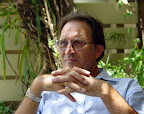I just read Yasmina Khadra's book L'attentat, published in 2005 by Éditions Julliard in Paris, France (an English translation with the title The Attack is foreseen to come out in May 2006). I finished the 268 pages in less than two days. The book ranks in my appreciation among the best I've come across over the many years I have been reading novels, which, I must mention, I choose selectively as I am a slow reader. Yasmina Khadra (whose real name is Mohammed Moulessehoul) has the kind of imaginative mind that also characterizes writers such as Gabriel García Márquez, Italo Calvino, and John Coetzee. While the reader progresses through the book an ever more intricate picture emerges of a reality that has no explanation in any single kind of logic. The more one advances, the more one becomes aware of the painful yet beautiful complexities of life and the realization that one reconciles with life's perpetual onslaught on life ultimately only in death.
Does it matter that the story is set in the Middle East and thus includes some of the ingredients that link it in our mind to the generalized anxiety generated by such highly publicized events as 9/11 and the bombings in Madrid and London? I don't think so. The ability to engage in incomprehensible acts of violence is not new to the world. It existed long before 9/11, Abu Ghraib and Guantánamo. We readily take incomprehensible violence for granted when it can somehow be embedded in the dominant discourses of the group to which we pertain ourselves and get confused and disturbed when it is part of the discourse of another community. The strength of Khadra’s literary creation is that there is no attempt in L’attentat to explain, categorically condemn or justify anything. The book refrains from demarcating good and evil, even though some of the most horrific human made events and circumstances provide the setting for the protagonist’s quest to comprehend.
This book is a welcome antithesis to some current trends to explain the complexities of the present day world away in terms of simplistic notions such as the clash of civilizations and cultures, or by dividing the world up in spheres of good and evil. In this book everything is human--and that isn't always entirely easy, but it’s real.
Books like Khadra’s L‘attentat, García Márquez’s Cien años de soledad (Hundred years of solitude), Calvino’s Se una notte d'inverno un viaggiatore (If in a winter’s night a traveler), or Coetzee’s Life and times of Michael K leave permanent marks in the mind in the form of complex images that are open-ended. It is this complex open-endedness that allows such marks in the mind to serve as architectural landmarks in building the mind’s capacity to interact with the world from perspectives that are increasingly more complex and eco-self-organizing, a term I borrow from Edgar Morin (see e.g. Introduction á la pensée complexe, Paris, Éditions du Seuil, 2005). For such complex images to take hold in the mind in an eco-self-organizing manner one must be emotionally prepared to receive and integrate them. When that happens, learning will be profound. It goes without saying that such deep learning can only take place under condition of non-coerciveness.
Sunday, April 16, 2006
Subscribe to:
Post Comments (Atom)

3 comments:
I am offended by Jan Visser's equating the "incomprehensible acts of violence" of 9/11, Abu Ghraib, and Guantanamo. The former was the unprovoked massacre of thousands of innocent civilians. So far as I know, no actual acts of violence were committed at Abu Ghraib -- only indignities heaped on captive terrorists, and those who did this were punished. My son was a military policeman at Guantanamo Bay. He is deeply religious and uncompromisingly moral. He tells me that no prisoner was ever mistreated there, not even the inmate who threw fecal matter into my son's face. Treating murderous acts of terrorism as equivalent to the "violence" of having underwear placed on your head is a vicious and evil distortion.
Obviously, it was not my intention to offend Dr. Draper or anyone else and I do appreciate that 9/11, Abu Ghraib and Guantanamo are all of a different category. They do relate, though, to complex realities that will be interpreted differently by people in different situations. In that sense is my reference to those three different instances not out of place with what Yasmina Khadra depicts in his novel, which is the story of a naturalized Israeli of Arab Bedouin origin, a surgeon by profession, who one day finds himself operating frantically to save the victims of a terrorist attack in Tel Aviv, only to discover after he returns home, exhausted, during the night following the attack that the kamikaze involved was his own, dearly beloved wife. I recommend reading the book when it comes out in English.
Additional comment: Anyone in doubt about the treatment of prisoners in Guantánamo should perhaps read 'Annals of the Pentagon: The Memo' by Jane Mayer in the 2006/02/27 issue of the New Yorker (available at http://www.newyorker.com/fact/content/articles/060227fa_fact).
Post a Comment